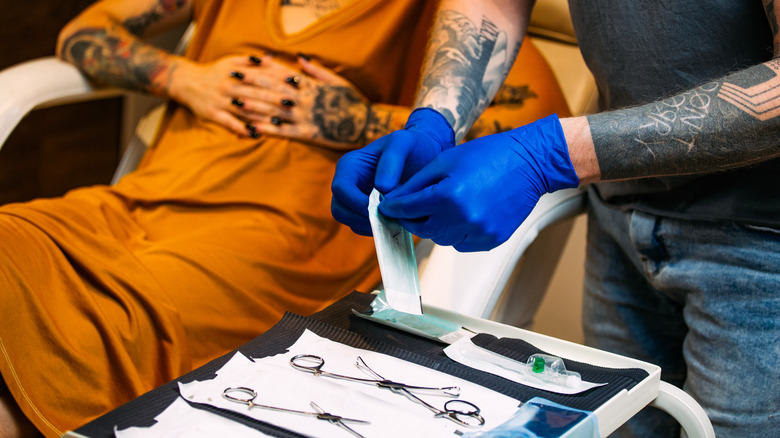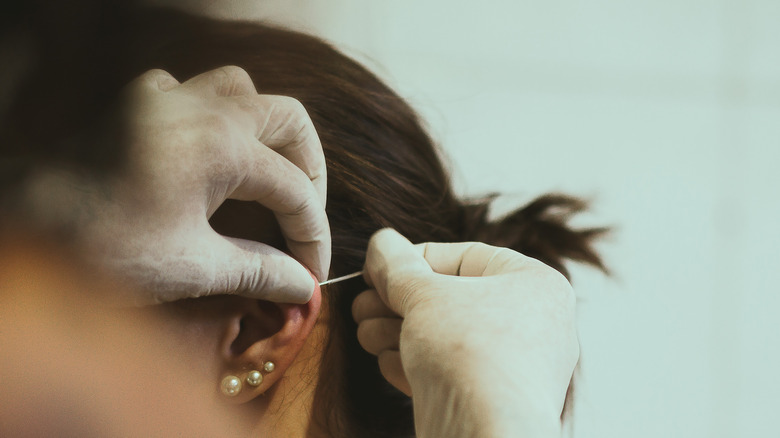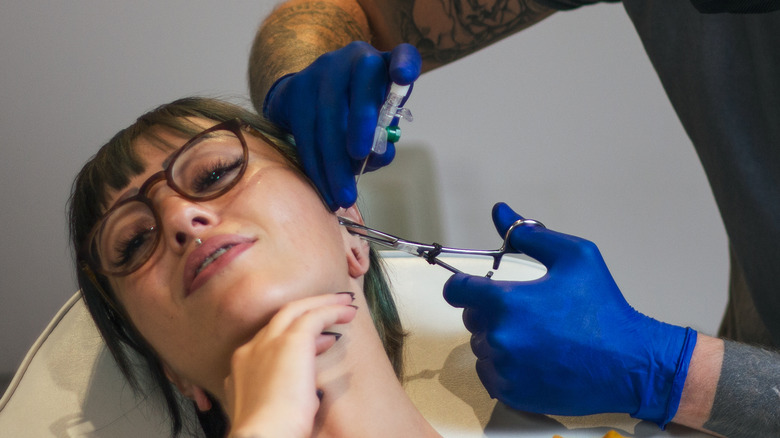How Long Should You Wait To Swim After Getting A Piercing
When the urge to get a piercing comes along, many people give right in. Piercings are relatively inexpensive, and they will eventually heal if you change your mind. But you might want to slow down and plan your piercings out more strategically. Most people know that they should avoid swimming after getting a tattoo, but it's the same for a piercing. According to the Mayo Clinic, you should avoid swimming after getting a piercing. That means that summertime and vacation might not be the best time to add another hole to your body.
Anyone who's sat down in a Claire's piercing booth when they were young knows that you'll have to use a saline spray to clean the piercing. But it turns out, piercing aftercare is a lot more in-depth than that. Along with making sure to wash your piercing and wait for it to heal, there are a ton of dos and don'ts when it comes to making sure your piercing heals probably (via NHS). Those dos and don'ts will change depending on where you've been pierced, too.
Here's a breakdown so you can plan your piercing accordingly.
You should avoid water until your piercing has healed
If you're looking for a quick answer, then no, you should not swim after getting a piercing. According to NHS, "you should avoid swimming for at least 24 hours after having a piercing, and ideally until it has healed properly." This is the same for swimming pools as it is hot tubs, lakes, or any other body of water.
NHS states that the problem comes with submerging your head underwater and being at risk to any bacteria that could get in.
To put it simply, you want to keep it dry until the piercing has healed, which takes anywhere from eight weeks to a year, depending on what you've had pierced (via Healthline). The full breakdown, according to NHS, is that ear piercings take six to eight weeks, belly button piercings take six months to a year, and nose piercings take up to six months. That makes the cold-weather months a great time to be spontaneous. (Unless, of course, you plan to go on a winter vacation.)
There are precautions to take if you can't avoid water after getting a piercing
Let's be honest: A year is a long time to not be in the water. Piercings heal from the outside in, meaning that even if you think the piercing is healed, you should give it some extra time, according to Koox Diving. While it's not doctor-approved, there are precautions and aftercare tips that you can take if you can't avoid submerging your piercing in water. "Piercings heal on the outside first and then on the inside," Koox Diving states. "Your ear piercing after swimming needs to be rinsed under running water to rinse off any germs that could cause infection." That means spending some extra time in the shower letting the water run on the piercing or sticking it under the faucet.
If your dip into the water is a bit more premeditated, you'll want to wear "a wound sealing waterproof bandage over the piercing" (via Koox Diving). "You need to cover the piercing area completely and make sure the bandage is secure," the outlet notes. This means that along with the saline spray that you pick up for aftercare, you might want to grab a pack of bandages as well. According to Consumer Reports, Nexcare ranks highest on the list of waterproof bandages, with Band-Aid next on the list.
Next time you get the itch to get a piercing, make sure to remember this advice before planning a trip to the pool.


